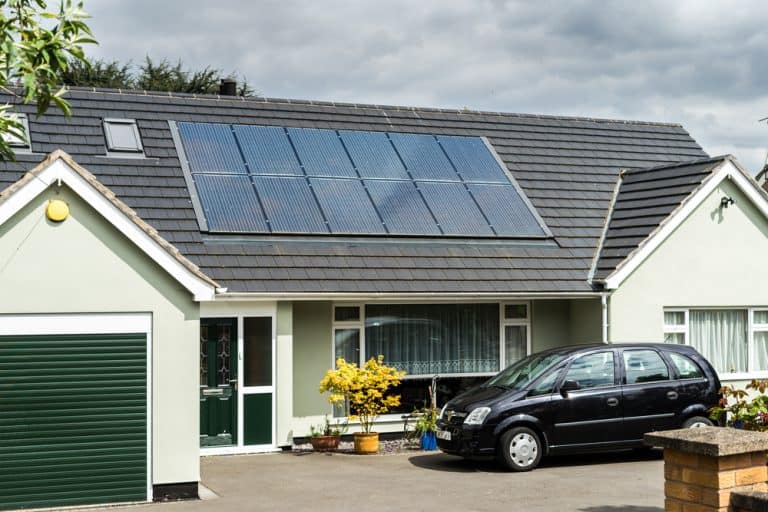The Importance of Solar Energy Storage

Because of the way solar panels work, solar arrays don’t generate continuous power on their own. They do, however, produce enough excess electricity to power a home throughout the year, which is why solar storage is necessary.
When solar first became popular, battery backup hadn’t caught up with their accompanying solar modules in technology and price point. In response, net metering policies emerged. Through net metering, solar customers can put their excess energy on the grid.
Utility companies keep track of solar customers’ net metering credits through the customer’s electricity bill. When the customer doesn’t have access to solar, the home automatically pulls from the grid, and the customer’s solar credits take care of all or most of the energy used.
However, net metering incentives declined in some areas. This means solar-powered homeowners should turn to battery backup to use excess solar produced from their modules at market rate.
The Solar Storage Wave
As solar has become more popular, energy storage has also seen tremendous improvement. These improvements have opened up the doors of opportunity for the solar industry. Through technological advancement in solar storage, homeowners can be grid-independent. Energy storage advancements also give homeowners power continuity during power outages. While the concept of battery backup power isn’t new, the options were once limited. Now there are several different ways to store solar energy. As professionals continue to explore these options, the possibilities for solar storage will increase.
Solar Energy Storage Methods
Today there are a couple of different energy storage methods on the market, with both battery backup and backup options. The three main competitors that have the most promise are thermal, mechanical, and battery storage.
Thermal energy uses heat retention methods, like molten salt storage, to capture and store energy for later use. Mechanical storage methods use short spurts of energy often generated from items with potential energy, which is then stored in the kinetic energy generated by unhindered mechanical movement. Battery storage stores electricity in a rechargeable battery.
Why Battery Backup is the Storage of Choice
While each of these options has its merits, the only option currently available to homeowners is battery backup. Batteries have taken residential solar by storm because they work well with residential systems.
How Energy is Stored in Home Batteries
Home battery backup systems store electricity via chemical reactions, which enable the solar-generated power to flow to the battery. This electricity charges the battery so it can power the home on demand.
When the homeowner is ready to use the stored power, an opposite chemical reaction occurs in the battery, and electricity is the byproduct. While similar to other rechargeable batteries, a home-solar battery is not the same. Using a car battery to power a home wouldn’t work nearly as well as a solar battery designed for home use.
Increasing the Potential of Battery Backup and Solar
While storing excess solar energy is excellent, savings will increase when array owners also conserve energy. Everyone could use a little more cash, which is why post-solar installation habits are important.
Not implementing these habits could cause homeowners to miss out on added savings from their energy storage options. There are many ways to reduce a home’s energy usage. Some include timing high energy activities, installing equipment that helps manage energy remotely, and updating appliances.
Timing High-energy Activities
Something that solar customers can do to conserve more energy is to pay attention to when they are performing high-energy activities. Often utilities charge more when power is pulled off the grid during high-demand times.
These times also happen to be when the sun isn’t out. Making sure that the laundry is being done during the morning or afternoon when the sun is out will conserve energy.
Smart Thermostats and Energy Conservation
Another way to conserve energy is to install a smart thermostat. These thermostats tell customers the best energy-conserving temperatures and give remote control over their home’s temperature.
Upgrading Old Appliances
When a fridge or water heater dies, it has to be replaced. However, what it is replaced with could make a difference. For solar customers, upgrading old appliances to all-electricity and energy-efficient ones allows the solar panels to cover more of the home’s energy needs.
Why Go Solar Group Uses Battery Backup
Solar storage for residential solar has been one of Go Solar Group’s product focuses from the beginning. We believe that every homeowner deserves to have some form of power security.
We decided to focus on battery backup because it gives our customers the most energy independence when coupled with solar modules for the home. With battery backup, customers can choose to power their home or their essentials.
This focus on storage has led us to where we are today. Go Solar Group offers its customers a suite of battery backup products.



Send a Message
Oops! We could not locate your form.